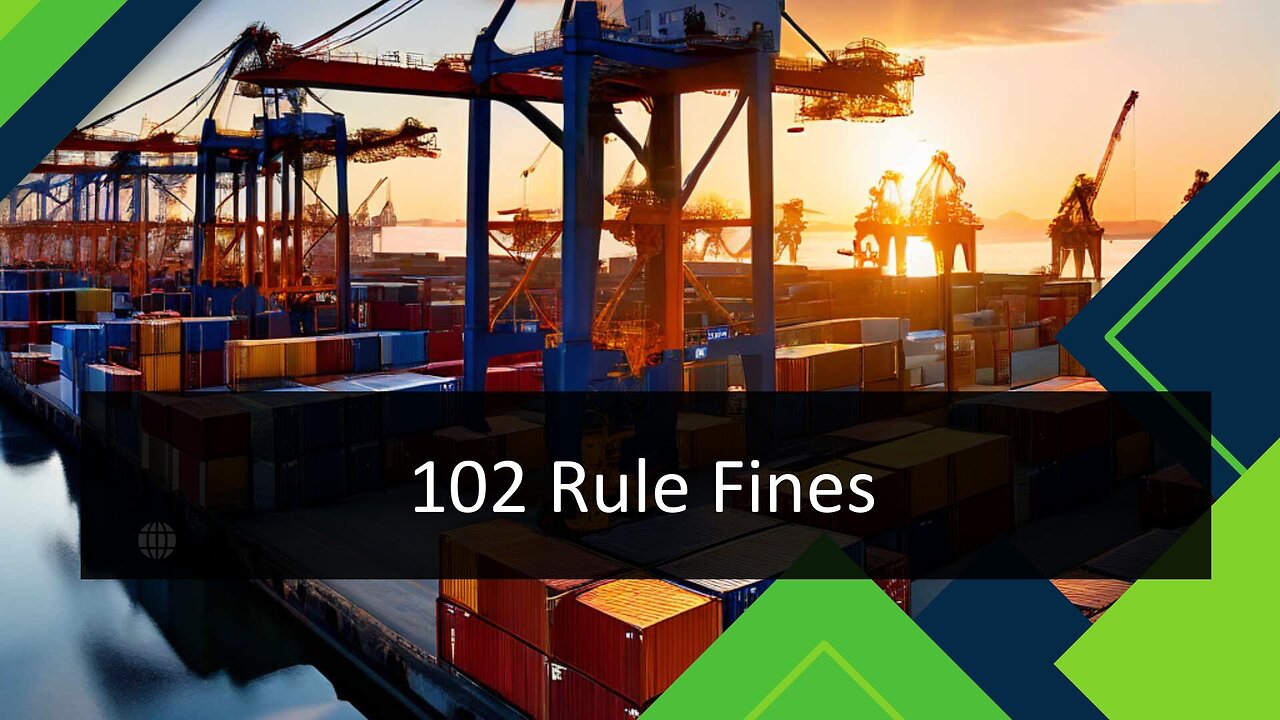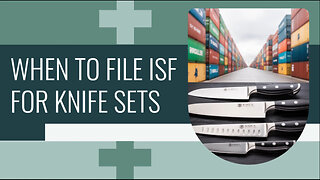Premium Only Content

Avoid ISF Penalties: How Non-Compliance with the 102 Rule Can Cost you Thousands
License To Import // 323-578-6432 // file@licensetoimport.com // www.licensetoimport.com
In today's video, we delved into the penalties associated with non-compliance with the 102 Rule, also known as the Importer Security Filing (ISF), which is a crucial requirement in the customs clearance process for imports. The ISF mandates that importers submit electronic information about their shipments to US Customs and Border Protection (CBP) before the goods are loaded onto a vessel bound for the United States. Failure to comply with these requirements can result in significant penalties.
The 102 Rule stipulates that the ISF must be submitted at least 24 hours prior to the cargo being laden aboard a vessel destined for the United States. It requires specific details about the shipment, including the seller and buyer, origin and destination of the goods, and the container and consolidator used. Non-compliance with these requirements can lead to penalties being imposed.
Penalties for non-compliance with the ISF requirements can vary depending on the severity of the violation, with CBP having the authority to assess penalties up to $5,000 per violation. It is important to note that each inaccurate, late, or incomplete ISF submission is considered a separate violation. Thus, multiple violations within a single shipment can quickly accumulate substantial penalties.
Importers should be aware that penalties can also be assessed retroactively, even if the goods have already arrived in the United States. CBP has the power to issue penalties for ISF violations after the fact, so importers cannot avoid penalties by rectifying the ISF requirements after the goods have arrived. It is crucial to submit accurate and timely filings to prevent unnecessary penalties.
To ensure compliance with the ISF requirements and mitigate the risk of penalties, many importers choose to work with customs brokers. These professionals are well-versed in the complexities of customs regulations and requirements, allowing them to assist importers in collecting the necessary information and submitting accurate ISF filings in a timely manner.
In addition to ISF compliance, importers should also pay attention to the customs bond. A customs bond serves as a financial guarantee that ensures payment to CBP for any potential duties, taxes, or penalties that may be owed. Importers are required to have a customs bond in place to facilitate the smooth flow of their goods through customs. Failure to possess a proper customs bond can result in delays and potential penalties.
In conclusion, adherence to the Importer Security Filing requirements is crucial to avoid penalties. Importers must submit accurate and timely ISF filings to CBP prior to the shipment of goods to the United States. Engaging the services of a customs broker can greatly assist importers in meeting these requirements and avoiding penalties. Moreover, importers must ensure they have a proper customs bond in place to facilitate the customs clearance process.
#usimportbond #isfcustomsbroker #uscustomsclearing #isfentry
Video Disclaimer Here: This video is solely for education and is not endorsed by any US government agency.
00:53 - The Importer Security Filing (ISF), also known as the 102 Rule, is a crucial requirement for importers to provide electronic information to US Customs and Border Protection before goods are loaded onto a vessel bound for the United States.
01:14 - Non-compliance with the ISF requirements can result in penalties of up to $5,000 per violation, with each inaccurate, late, or incomplete submission considered a separate violation.
01:29 - To avoid penalties, importers must work with customs brokers to ensure accurate and timely ISF filings and have a proper customs bond in place to facilitate the smooth flow of goods through customs.
-
 1:39
1:39
License To Import
26 days agoWhen To File ISF For Knife Sets
9 -
 24:58
24:58
Law&Crime
7 hours ago $1.38 earnedSecond Note Leaves Disturbing Clues in New York City Killings
22.3K5 -
 1:36:57
1:36:57
Badlands Media
22 hours agoAltered State S3 Ep. 39
52.6K10 -
 2:04:07
2:04:07
Due Dissidence
12 hours agoCharlie Kirk's GAZA LIES, Caitlin Clark Stalker, Palantir Goes Hollywood - w/ Kyle Matovcik | TMWS
27K6 -
 LIVE
LIVE
I_Came_With_Fire_Podcast
13 hours agoAmerica First, Trump Threatens China, Your Friendly Neighborhood Illegal, EPA Gets a "W"
387 watching -
 LIVE
LIVE
Geeks + Gamers
3 hours agoGeeks+Gamers Play- MARIO KART WORLD
158 watching -
 8:28:19
8:28:19
Dr Disrespect
12 hours ago🔴LIVE - DR DISRESPECT - BATTLEFIELD 1 - FULL GAME
165K7 -
 1:39:26
1:39:26
Glenn Greenwald
8 hours agoStephen Miller's False Denials About Trump's Campus "Hate Speech" Codes; Sohrab Ahmari on the MAGA Splits Over Antitrust, Foreign Wars, and More | SYSTEM UPDATE #495
109K56 -
 1:57:28
1:57:28
Omar Elattar
8 hours agoThe $300M CEO: "The One Skill That Made Me Rich In 15 Different Countries!"
18.9K -
 LIVE
LIVE
xXFadedAngelXx
4 hours ago180 HOURGLASS PULL! Wisdom of Sea and Sky (Pokemon TCG Pocket) Then some RL with Meditayte later
18 watching